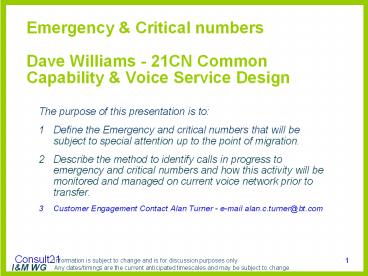Emergency PowerPoint PPT Presentation
1 / 12
Title: Emergency
1
Emergency Critical numbersDave Williams -
21CN Common Capability Voice Service Design
- The purpose of this presentation is to
- Define the Emergency and critical numbers that
will be subject to special attention up to the
point of migration. - Describe the method to identify calls in progress
to emergency and critical numbers and how this
activity will be monitored and managed on current
voice network prior to transfer. - Customer Engagement Contact Alan Turner - e-mail
alan.c.turner_at_bt.com
2
Emergency Critical Numbers - Introduction
- It is BTs business as usual practice to
implement special measures for critical numbers
when carrying out planned engineering works - Examples of such engineering works are-
- When re-parenting a Concentrator
- When carrying out planned maintenance
- BT has a responsibility to ensure that calls to
Emergency and Critical numbers are managed
appropriately
3
Emergency Critical Numbers
- This is our definition of emergency and critical
numbers. - These numbers would be subject to specific checks
at the point of transfer to ensure calls are not
in progress - 999
- 112
- 18000 - Text Direct
- Child-line - Non-Geographic Number
- Samaritans - Non-Geographic Number
4
Emergency Critical Numbers - Requirements
Submission
Any requirement for the consideration of
additional specific types of Emergency and
Critical numbers should be submitted to Alan
Turner 21CN Customer Engagement Manager -
Business Continuity Email alan.c.turner_at_bt.com
or Consult 21 mailbox - consult21_at_bt.com Respons
es required by Tuesday 4th April 2006
5
Emergency Critical Numbers Caveat
A significant increase in the number of emergency
and critical numbers identified could potentially
undermine the capability and process to apply
special calls in progress monitoring checks.
The definition that should be applied therefore
is the commonly accepted categorisation of having
life or death significance. BT Wholesale
reserves the right to negotiate and take the
final decision in this matter to avoid
jeopardising the integrity of the process to
manage calls that fall into this category.
6
Emergency Critical Numbers - Identification and
Monitoring Method
NB. This activity will be carried out on the
current voice network prior to transfer. Calls
from end users routed via a migrating DLE to the
identified emergency critical cumbers will be
identified within the on the night time window
for that DLE migration. The chosen method to
monitor calls to the identified emergency and
critical numbers will employ the use of Geoprobe
Signalling Monitors. The Geoprobe capacity is
dimensioned to accommodate busy hour call attempts
7
Voice Network Architecture and Signalling
Interception point
999/112 18000 08XX
Trunk Switch
DLE
999/112 18000 08XX
999/112 18000 08XX
C O N C
Signalling monitor (Geoprobe) on all Tandem OA
routes
Intelligent Network Platform
Text Platform
Operator Assistance Platform
999/112 18000 08XX
- Concentrator equipment that customer lines are
connected to within the existing network. - DLE provides connectivity between concs and
trunk switches. They are either dual or triple
parented to the tandem layer. - Trunk Switch There are a number of types of
trunk switches which are all fully interconnected.
8
Description Of Monitored Platforms
- OA platform Operator assistance Platform (of
which there are three) has routes from a number
of trunk switches. All of these OA-trunk routes
have signalling monitors. - Text platform Text Platform (of which there are
two) has routes from a number of trunk switches.
All of these Text-trunk routes have signalling
monitors. - IN platform The IN platforms are connected to
the trunk switches where calls to the non
geographic Childline Samaritan numbers are
triggered. All routes between the trunk switches
and the IN platforms have signalling monitors.
9
999/112 Routing to Emergency Authorities
ISPBX
DLE B
C O N C
Trunk Switch
EA 1 (Alternative) EA 3 (Primary)
OA Platform
ISPBX
DLE A
C O N C
Trunk Switch
EA 1 (Secondary)
Migrating DLE
DLE A
ISPBX
DLE X
C O N C
Trunk Switch
EA 1 (Primary)
10
Primary and secondary routing arrangements on
previous diagram
- Emergency Authorities (EA) have Primary,
Secondary Alternative numbers. The primary
Secondary numbers are usually served from the
same DLE. Where the Primary Secondary are not
available the Alternative number is used. - The 999 Liaison team who manage the OA team have
a process to advise/route calls to the
Alternative number if the Primary Secondary are
unavailable. - This process will be used to ensure that where an
EA is connected to a migrating DLE emergency
calls will be routed to an alternative EA.
11
Summary of Emergency Critical measures during
migration
BT Wholesale will proactively identify and
monitor calls to Emergency and Critical
numbers Communication Providers have the
opportunity to suggest additional Life or Death
numbers The end user availability of access to
the emergency services will be minimised to the
period of time when outgoing calls cannot be
made.
12
Glossary
- Conc Concentrator
- DLE Digital Local Exchange
- EA Emergency Authorities
- IN Intelligent Network
- OA Operator Assistance

